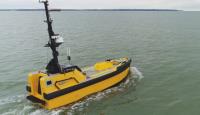 Add My Company
Add My Company
Sign In
AUTONOMOUS SURFACE VESSELS RESEARCH
14-05-2018

Houlder is part of a new £900k joint industry project set to explore the technical, regulatory and societal issues of using autonomous surface vessels, integrated with existing manned shipping operations, to support offshore wind farm operations and maintenance.
The ultimate goal of the 18-month Windfarm Autonomous Ship Project (WASP) is to develop a timeline for the phased introduction of autonomous surface vessels.
Previous research has found that vessels can account for as much as 60% of an offshore wind farm’s operating costs, which in themselves make up almost a quarter of the total lifecycle costs. These costs could be significantly reduced through the introduction of Robotics and Artificial Intelligence (RAI).
Increasing use of autonomous vessels will also lead to the creation of highly skilled, cross sector jobs in areas such as the integration and planning of autonomous surface vessels, boosting the UK’s maritime and digital supply chains.
The project, which is part funded by Innovate UK and led by ASV Global, in partnership with the Offshore Renewable Energy (ORE) Catapult, SeaRoc Group and University of Portsmouth, will set out to verify the benefits and build the case for the use of autonomous vessels.
As part of the project, ASV Global will be further advancing its world-leading autonomous control system to tackle the challenges presented by the operation of autonomous surface vessels in the constrained environment of a windfarm. ORE Catapult will work on the use cases and validation of the cost savings created by the project.
SeaRoc Group will be extending its SeaPlanner software to assist with the monitoring and operation of autonomous vehicles and the introduction of advanced cargo planning systems. Whilst the University of Portsmouth will assist with efficient route planning, logistics management and system analytics. Houlder will develop the vessel design and an innovative handling system to enable autonomous cargo transfer.
The project team will work with industry sponsor Ørsted, who will provide use cases from its Hornsea One offshore wind farm, located 120km off the Yorkshire coast. Manned operations will be used as the baseline to compare the time, cost and performance of unmanned ships in different roles, including asset surveillance, security patrols, component spares supply and crew transfer operations.
New products will come from adaptation of marine co-ordinator systems to operate with both manned and unmanned vessels, optimised navigation systems from autonomous vessels and robotic systems to support offshore operations.
For more information on AUTONOMOUS SURFACE VESSELS RESEARCH talk to Houlder Ltd
Enquire Now
List your company on FindTheNeedle.

